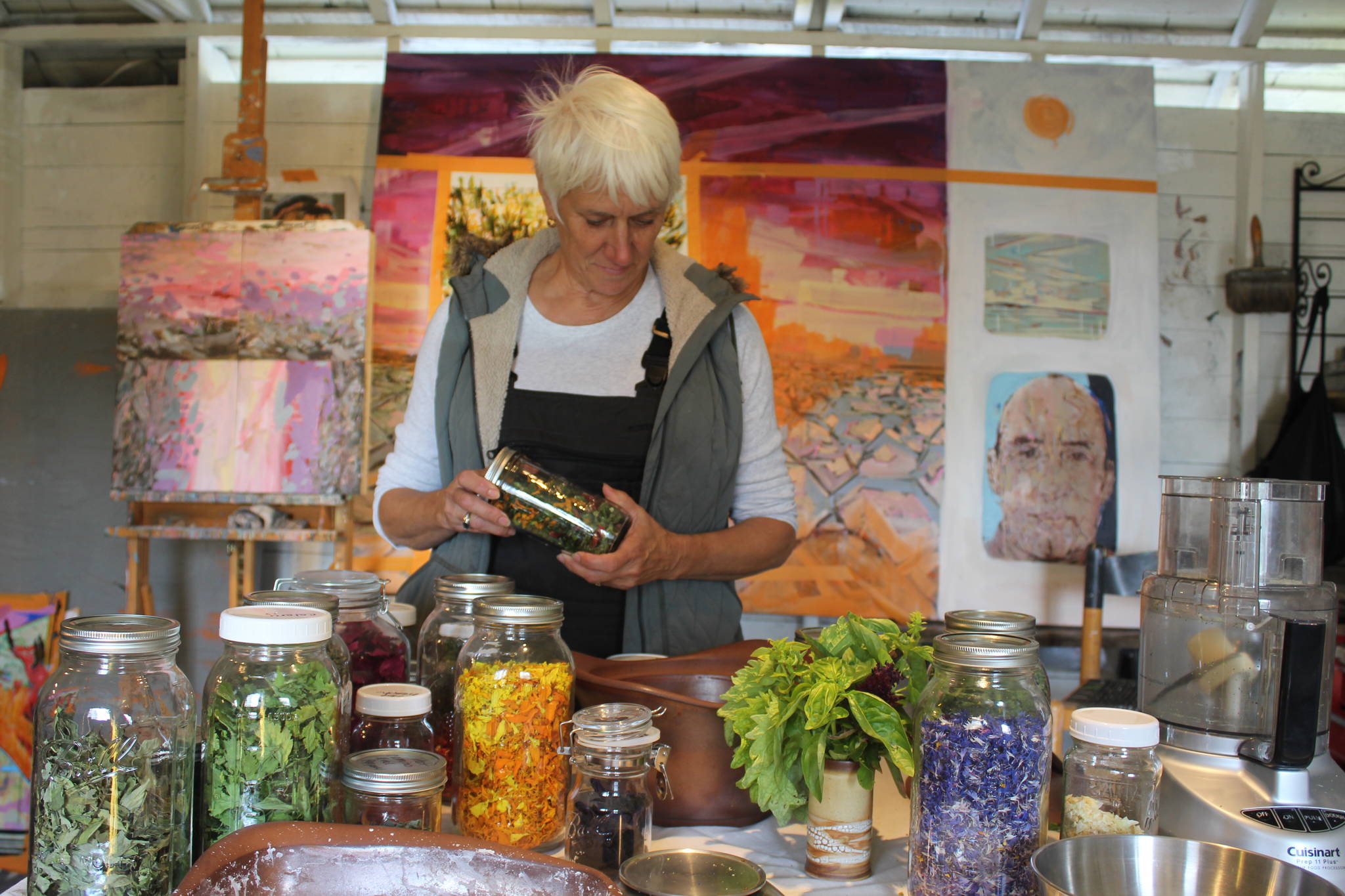“We grow edible flowers, and we harvest salt from the cove.”
Kim Gruetter gets right to the point when describing her sea salt enterprise in Penn Cove. And that straight-shooting personality serves her well in the sometimes-arduous process of turning five-gallon buckets of cove water into fresh, unadulterated sea salt.
In two back-to-back classes last week, Gruetter and members of Whidbey Island’s Slow Food USA chapter offered a glimpse into how simple seawater from the cove ends up in colorful packets of salt blended with edible flowers and dried herbs, peppers and other organics.
It’s easy to assume a big factory-style operation with lots of helping hands, but Salty Acres Farm in Central Whidbey is a “cottage industry” in its purest form. The hands belong to Gruetter, and so does the passion – even though her husband’s first response was, “What kind of crazy person decides they’re gonna make salt?”
The location of the farm was a crucial enabler when Gruetter first came up with the idea. She explained to the eager class participants what makes it possible for her to gather salt from the cove.
“We’re right across from the mussel flats,” she said. “The flats along the shoreline are loaded with Penn Cove mussels, and there are, I believe, five different kinds of clams in our sand down there, as well as oysters and all kinds of things.”
What’s vital about the mussels is that the bivalves do nothing but clean water, according to Gruetter. One bivalve cleans between 14 and 20 gallons a day, which means clear water that needs less filtering and purification. To demonstrate, she holds up a glass of crystal-clear water freshly scooped from the cove.
“It’s amazing; you can see 20 feet down,” she said, before describing how she crosses the road to a winding trail leading straight down to the cove and then lugs five gallons at a time up and over to the farm.
Even though the water is essentially clean, they always filter it to remove any micro-organisms or solids. And they never harvest after a rain because brackish waters mean extra work, which the mussels will naturally do for them within about three days after a storm.
Then the real work begins. Using marine-grade pots (because ordinary ones split, warp and crack from the salt), they boil the water on a propane burner for hours and hours, adding more water and continuing to boil until salt crystals form.
“The first time I did it, after boiling for about eight hours and almost giving up, it started making this funny noise,” Gruetter said. “I looked in there, and it was like this magical fireworks show. The crystals were about to form … and it looked like these little diamonds just shooting through the pot.”
When it reaches a certain stage, she moves the salt to clay pots made by local Whidbey artist Robbie Lobell from Cook on Clay. Hesitant at first to use the cookware because of the intense process of cooking the salt overnight, with it crawling up the sides, crystallizing, and getting mashed down and broken up, they discovered that the Cook on Clay pots actually retained the heat for so long that they could turn the oven off and it would be perfectly dry.
The sea salt from Salty Acres is never bleached for color or chemically filtered, and there are no harmful additives such as anti-caking agents or chalk – which Gruetter notes are things that aren’t even required to be listed in “standard” iodized salt products such as Morton’s. Without the additives, salt naturally draws moisture, which can be easily remedied by putting it in a 250-degree oven for about an hour.
“When you have salt that sits out and doesn’t draw moisture, you have more than salt,” she explained. “And that’s probably something you should not be putting in your body.”
Sea salt in its natural form has a deep history in the Pacific Northwest, long before it became a processed product sitting in round blue cans on every grocery store shelf. The U.S. Center for Military History states that when Lewis and Clark came down the Columbia River in 1805, stopping in Astoria and Seaside, Ore., they spent many weeks processing salt in five huge iron kettles to preserve their meats.
The Lewis and Clark salt-making camp kept the fires burning throughout the day and night, turning an estimated 1,400 gallons of water from the surf into about 28 gallons of salt. The campsite is now reconstructed as the Seaside Salt Works.
With the surprisingly similar process taking place at Salty Acres Farm on Whidbey more than 200 years later, Gruetter notes that it’s pure sea salt and is naturally anti-microbial and anti-bacterial.
She also laughs and admits to becoming “salt snobby” since taking her hobby to entrepreneur status. A lot of Whidbey Island chefs now use her salt, at least partially because it leaves no distinct aftertaste.
Flavors in the Salty Acres salt blends come from the edible flowers and herbs grown onsite, including roses, calendulas, bachelor’s buttons, marigolds, hollyhocks, dahlias, shishito, sea lettuce and dozens more.
The blends end up in salads and desserts at restaurants such as the Captain Whidbey Inn, and they’re available for purchase at Orchard Kitchen in Langley or the Oystercatcher in Coupeville. The Salty Acres website also sells sea salt packets online, either coarse, fine or in blends with names such as Penn Cove, Confetti and Sunset Blends.
To order the local Whidbey sea salts or inquire about future classes, visit saltyacresfarm.com.


